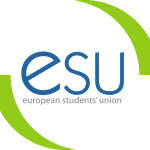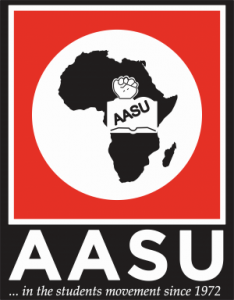Statement: Students’ expectations, hopes and criticisms towards the upcoming 6th EU – AU Summit in Brussels
On the 17th and 18th of February 2022, the 6th European Union (EU) – African Union (AU) Summit will be held in Brussels. The Summit comes at a crucial time. The COVID-19 pandemic is far from over, the economic conditions are still hit by uncertainty, and the climate crisis remains an ever-present threat looming in the background.
The All-Africa Students Union (AASU), the European Students’ Union (ESU) and the Global Student Forum (GSF) believe that the relations between the African and European continents must be based on a partnership of equals, based on dignity, mutual respect, and recognition of the legacy of the past. Furthermore, it must be based on the principle of self-determination, i.e., the right of the peoples of both continents to autonomously take their own decisions. AASU, ESU and the GSF believe that only by avoiding neo-colonial policies and actions and by allowing each party to have the means to stand as equal partners can a common vision for the two continents be shaped.
Investment in Education
Last year, EU and AU Ministers discussed the economic impact of the pandemic, encouraging stimulus programmes of private and public investments in sectors with a ‘high multiplier effect for economic recovery and job creation’. They supported the swift implementation of the G20 Framework on Debt Treatments as a means to address liquidity issues and long-term growth in Africa. But these engagements failed to focus on concrete investments in Education: despite the recognisable commitment, at the European level, to Next Generation EU (even if with an overall inattention to the involvement of student unions for funding policies on education). Prior to the COVID-19 pandemic, 97.5 million children and young people were not in school, and UNESCO estimated that 56% of primary-school-age children don’t have access to basic reading skills.
4.1 million more teachers were estimatedly needed to achieve universal primary and secondary education. With the outset of the COVID-19 pandemic, we are convinced that the situation may worsen if practical and immediate solutions are not employed. Thus, we support the coalition of civil society organisations led by the Global Campaign for Education that, through the joint open letter “Improve the AU-EU strategic partnership by ensuring that education for all is at the centre” , pointed out the crucial importance of investments in education. We underline how further financial investments in education are a central part in the partnership between the African Union and the European Union. The funding channels already exist: for instance, the Africa-EU Partnership on Higher Education, AfricaConnect in the relevant field of the digital transition, and the EU-Africa High-Level Policy Dialogue on Science, Technology and Innovation. ESU, AASU and GSF believe that these investments cannot be limited to employability and entrepreneurship, as outlined by the European Commission’s communication ‘Towards a comprehensive Strategy with Africa’, but it must be centred around the open access to basic social services and quality education as a fundamental right, as requested by the European Parliament.
In December 2021, the European Commission presented its Global Gateway Strategy as a way to give tangible evidence of the call for a ‘geopolitical Commission’ and as an alternative to the Chinese Belt and Road Initiative. In particular, the Strategy includes a section on Education and Research. While we welcome the individual measures indicated in the Strategy, ESU, AASU, and GSF believe that education and research must work for the friendship and collaboration of all the peoples of the world and not be co-opted within the race among competing global powers. For this reason, the indication by the current French Presidency of the EU Council that investments in education would be a main tool of cooperation between Europe and Africa must be delivered as a partnership between equals and not as a tool to exert European influence over Africa at the expense of other global players.
International Mobility
The intra-continental student exchange programmes (Erasmus+ in Europe, the Intra-Africa Academic Mobility Scheme in Africa) are a key component for the development of a sense of understanding and community across students within Africa and Europe. That sense of understanding and community between the young generations of the two continents is a fundamental element for the long-term strategic partnership between Africa and Europe. That is why AASU, ESU and GSF support the establishment of an Africa-Europe academic mobility scheme; such a scheme shall promote brain circulation between students and staff of Higher Education Institutions (HEIs) of both continents, and shall promote partnerships between HEIs of the African and European Union. This can, as well, be a great step to reduce the increasing levels of brain drain. Consequently, we are also of the conviction that the Global Convention on the Recognition of Higher Education Qualifications (GCRHEQ) will support actions to streamline and strengthen student and academic mobility schemes across Africa and Europe. Education leaders from both continents should be committed to adopting the ideals of the Global Convention while supporting countries with underdeveloped accreditation and recognition frameworks to catch up in due time. Under the AU-EU partnership, we have seen the proliferation of harmonisation initiatives expected, among other things, to facilitate the assurance of best practices in Higher Education across the African continent. Clearly, efforts are likely to fail if the projects and its results are not based on the recognition of the different contexts at play and the complexities to be considered in each region.
Fostering the knowledge of Africa in Europe
As of today, knowledge and education about Africa’s history and culture in Europe is still limited. Cooperation and understanding can be based only upon a mutual knowledge of each other’s’ history, cultures and languages, as well as on the acknowledgement of the colonial past and its long-lasting effects. AASU, ESU and GSF promote more attention to the history, cultures and languages of Africa in European schools and Higher Education Institutions, as well as thorough teaching of the past colonialist and imperialist policies by some European countries towards Africa and their political, economic, social and cultural impact upon African peoples and societies. On languages, attention should be given to promoting the knowledge in Europe of the languages spoken in Africa, beyond the European ones, with a focus on widely spoken, cross border languages, in partnership with institutions such as the African Academy of Languages.
Vaccine Justice
In the waves related to the Omicron Variant, the Global Student Forum once again, after the 2021 international online summit ‘Vaccine Justice through Fairness, Trust, and Responsibility’ in Port-of Spain, Trinidad and Tobago, chose to advocate for a just distribution of COVID-19 vaccines, supporting countries that have lobbied for vaccines to be treated as a public good free from patents. Even as the WHO has called for helping the COVAX Facility support fair distribution of vaccines, governments in richer countries have raced to secure vaccines for their national interest and deployed vaccines as a bargaining chip in vaccine diplomacy. The result of such actions is that just 10% of African people are fully vaccinated. As recently stated by The One campaign, “by mid-January, 9.7 billion COVID-19 vaccine doses had been administered globally; only 334.3 million (3.4%) were administered in African countries. Some countries, such as Burundi, the Democratic Republic of the Congo, and Chad, have less than 1% of their populations vaccinated. If current trends continue, most African countries – home to more than 1 billion people – are not likely to achieve the WHO target to vaccinate 70% of their populations by mid-2022.
In fact, it could take several years before some African countries fully vaccinate the majority of their populations against COVID-19″. These developments illustrate the persistence of global political and economic inequalities that put up barriers to serving the global public good. AU and EU Ministers agreed to enhance cooperation in their response to the pandemic, stressing the importance of further investments in diagnostics and social protection, starting from the development of local manufacturing hubs and equitable access to vaccines and health technologies. However, the European Union is still opposing its veto to the sharing, albeit temporary, of vaccination licenses, which is impeding the increase in the global production of vaccines necessary for a global recovery from the pandemic, ultimately hurting the European Union itself. In this sense, we are well aware of the complexity of the context: on the one hand, the EU is one of the main donors to the COVAX Facility and in the export of vaccines, but, on the other hand, it is clear that, with a limited vaccine production capacity, securing billions of doses creates a problem of shortage for the other Countries. The vaccine hesitancy in the EU is making the vaccines go wasted or donated to third Countries which don’t have enough time to distribute it and need to destroy them, as happened recently in Nigeria. We ask again to the EU-AU Summit to disavow corporate and nationalist monopolies on vaccine production, research and development and act to rebalance vaccine distribution that values people first and profit second, endorsing the Trade-Related Aspects of Intellectual Property Rights (TRIPS) waiver proposal initiated by India and South Africa and actively advocating for other governments to follow this proposal.
Brain Drain
One of the key aftermath challenges of student and academic mobility is the unwillingness of individuals to return to their home country after acquiring new skills and knowledge. The African Union (AU) reports that about “70,000 skilled professionals emigrate from Africa every year”. This constitutes brain drain. The heightened levels of brain drain affect the continent’s ability to enhance the delivery of healthcare and the attainment of key educational outcomes. Brain drain stifles the socio-economic development of Africa and its people. The effect of brain drain transcends the loss of human capital, and it extends to other economic losses such as income taxes. The majority of young Africans are willing to leave their homes in pursuit of economic prospects in other countries. This is a result of limited employment opportunities and the inadequate infrastructure that facilitate skill and overall professional development. To reverse this phenomenon, there is the need for deliberate actions to create a climate that fosters merit-based employment opportunities, contextualised education systems, and well-structured incentive schemes. As indicated by the President of the African Development Bank, Akinwumi Adesina; the future of Africa’s youth should not lie in migration to Europe; it should be hinged on a prosperous Africa.
Digital Inclusion
The outset of the COVID-19 pandemic and its consequent impact on education has exposed the widening digital divide in most parts of Africa and how it can affect the accessibility of education on the continent. When schools were shut down, children living in communities without the enabling technologies had to spend weeks at home with limited to no opportunities for teaching and learning.
At the 5th AU-EU Summit, leaders from both continents resolved to ‘support investments in digital infrastructure and mainstreaming digitalisation as an enabler to increase efficiency and effectiveness of interventions in all sectors. Now more than ever, this intervention is critical and much needed to ensure that we are able to sustain education for all students in both continents, especially for children living in the most marginalised communities. In doing this, it is required of leaders from both continents to recognise the key areas required to ensure a revolution of increased investments in digital infrastructure. It is worth indicating that the African region accounts for almost half of the global population not covered by a mobile broadband network.
From a leaders’ summit to a peoples’ summit: bring in civil society!
At the 2nd AU-EU Ministerial Meeting of the 25th-26th October 2021, the ministers affirmed that ‘a people-centred approach is at the core of the AU-EU multi-stakeholder partnership and they committed to ensuring the active participation and engagement of civil society, youth, local authorities and parliaments in the partnership dialogue in view of and at the next EU-AU Summit’. However, as the Confederation of European NGOs, CONCORD affirmed Civil society involvement is lacking, both in preparation for the summit and in establishing ‘institutional and operational structures and mechanisms for meaningful civil society participation in policy processes, including ‘information-sharing, consultation, transparency, and open dialogue. The Africa-Europe Week, despite being an important moment of meeting between different sectors of civil society of the two continents, is not enough neither in terms of inclusiveness in its setting nor in terms of outcomes and their influence on the proceedings of the Summit.
AASU, ESU and the GSF believe that any policy projects that affect education must be consulted with all the educational stakeholders, including students, and support the establishment of structural mechanisms for the involvement of educational stakeholders in preparation to and in between two summits. Furthermore, civil society of both continents must be allowed to participate as observers to the summit. Long-term cooperation can be fostered only through the involvement of the citizens of Africa and Europe: we don’t need just a leaders’ only summit; we need a peoples’ summit!



